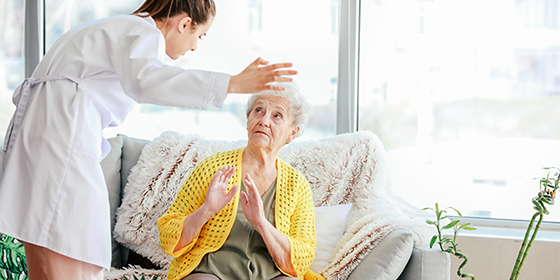Nursing Home Abuse Lawyer

After getting a new roommate at the nursing home, your elderly father, who had dementia, began to lose weight, and you noticed small cuts and bruises on his hands and face during your regular visits. The facility manager assured you that your father was eating his meals and that the injuries you noticed were normal for people of his age. You remained skeptical, and the following Sunday, made a surprise visit during mealtime. Unseen just outside your father’s door, you heard a clatter of dishes. You looked in to find the roommate emptying your father’s food onto his own tray, leaving only some limp broccoli and a cup of tea behind. The roommate pinched the back of your father’s hand, saying, “I’m warning you again, don’t tell anyone, or you’ll get worse than this.” That was all you needed to see. The staff was not protecting your father from the abuse of his roommate. You decided to call a nursing home abuse lawyer and handle the situation legally.
The Basics of Nursing Home Abuse
Nursing home abuse occurs within a professional care facility. Victims may be elderly, aged mid-60s and above, or they may be younger with mental or physical impairments. The abuser causes harm to the victim through intentional actions or neglect. This violation or trust is especially significant because the caregiver has a legal responsibility to protect patients from harm.
The percentage of Americans who are over age 65 has steadily increased over the past century and now stands at an all-time high of around 15 percent. Additionally, Americans on average are living longer than ever before, with many reaching their 80s and 90s. The need for elder care is booming, and with that growing need comes a spike in the incidence of abuse. Some reports estimate that 10 percent of elderly people experience neglect or abuse, whether verbal, physical, or financial.
Risk Factors for Nursing Home Abuse
Many nursing home patients are reluctant to rock the boat by reporting abuse, or they fear retribution by their abusers. Patients with dementia may not remember the abuse, or if they do, nobody believes their stories. Some of the risk factors for becoming the target of abuse in a care facility include:
- Lack of a social support network
- Diminished mental capacity
- Prior abuse
- Ill health
- Poverty
Even if your loved one does not fit into any of these risk categories, you should seek advice from a nursing home abuse lawyer if you suspect a problem.
Signs and Symptoms
Help protect your loved one from nursing home abuse by watching for signs and symptoms of trouble, such as:
- Cuts, contusions, abrasions or burns
- Missing teeth, broken bones, head injuries
- Chronic soreness
- Weight loss, dehydration
- Problems sleeping
- Depression, anxiety, fear
- Social isolation
If you detect any of these signs, do not hesitate to speak with the nursing home staff members about it. If they take no action to protect your loved one from further injury, you should seek the help of a nursing home abuse lawyer.
Help in California for Abuse Victims
Abusing another person is against the law, and the abuser is financially responsible for the victim’s damages. At Rizio Lipinsky Heiting of California, we advocate for victims of nursing home abuse and fight for the financial compensation they are entitled to by law. Call us at 888-292-8888 or complete our contact form to schedule a no-cost initial consultation.
- This article should only be used for informational purposes. It does not constitute legal advice, and it does not create an attorney-client relationship with anyone. If you need legal advice, please consult an attorney in your community.

